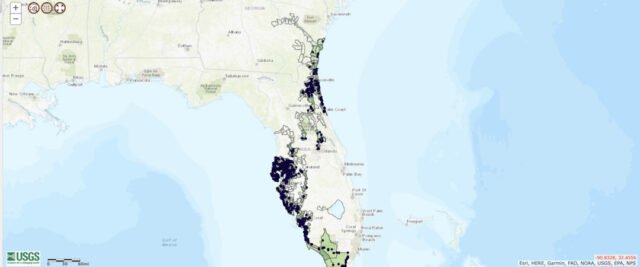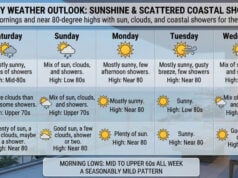
Recent hurricanes and associated flooding may have transported hundreds of nonnative species into Florida and Georgia, according to maps prepared by the U.S. Geological Survey (USGS).
A preliminary map for Hurricane Helene indicates that 222 nonnative species “had the potential to spread due to storm-related flooding, of which 90 species are considered invasive and likely to spread via flood waters,” said Ian Pfingsten, a USGS one of the scientists who created the maps, in a press release.
The preliminary map for Hurricane Milton indicates 114 possible non-native species had the potential to spread, of which 56 species are considered invasive and likely to spread via flood waters, he added.
Among species of concern that may have been spread by Helene and Milton are the Giant Apple nail and the Asian swamp eel. Both species can pose a risk to human health as they are known to carry parasites.
The preliminary map for Hurricane Helene also indicates that flathead and blue catfish, a couple of large invasive predators along the coastal plains, had the potential to spread to new areas. Both species have demonstrated major food web effects in areas where they have established themselves, feeding on and competing with native species.
According to Pfingsten, additional species of concern include Cuban treefrogs and alligatorweed. Cuban treefrogs prey on and outcompete native frog species, damage infrastructure, and secrete a noxious chemical that can cause burning in the eyes or nose if a human handles them. Alligatorweed can clog waterways, damage infrastructure, and can lead to stagnant water that supports mosquitos breeding.
Disclaimer
Artificial Intelligence Disclosure & Legal Disclaimer
AI Content Policy.
To provide our readers with timely and comprehensive coverage, South Florida Reporter uses artificial intelligence (AI) to assist in producing certain articles and visual content.
Articles: AI may be used to assist in research, structural drafting, or data analysis. All AI-assisted text is reviewed and edited by our team to ensure accuracy and adherence to our editorial standards.
Images: Any imagery generated or significantly altered by AI is clearly marked with a disclaimer or watermark to distinguish it from traditional photography or editorial illustrations.
General Disclaimer
The information contained in South Florida Reporter is for general information purposes only.
South Florida Reporter assumes no responsibility for errors or omissions in the contents of the Service. In no event shall South Florida Reporter be liable for any special, direct, indirect, consequential, or incidental damages or any damages whatsoever, whether in an action of contract, negligence or other tort, arising out of or in connection with the use of the Service or the contents of the Service.
The Company reserves the right to make additions, deletions, or modifications to the contents of the Service at any time without prior notice. The Company does not warrant that the Service is free of viruses or other harmful components.












